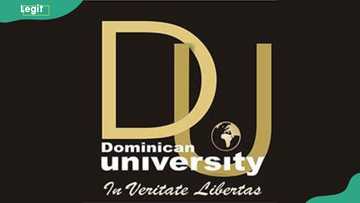Understanding the Library and information science JAMB combination
Choosing the correct library and information science JAMB combination is essential for gaining admission into a Nigerian university. The required subjects may vary depending on the faculty offering the course: Education, Science, or Social Science. Understanding these requirements and preparing strategically will significantly enhance your chances of admission.

Source: UGC
TABLE OF CONTENTS
- Key takeaways
- Library and information science JAMB combination
- WAEC subject combination for library and information science
- Direct Entry requirements for library and information science
- UTME and Post-UTME preparation tips
- Universities offering library and information science
- What is the subject combination of library and information science?
- Is library and information science an art course in Nigeria?
- Is Mathematics compulsory for library and information science?
- What is the cut-off mark for library and information science?
- Which universities offer library and information science in Nigeria?
Key takeaways
- Subject requirements vary depending on whether the course is offered under the faculties of Education, Science, or Social Sciences.
- Most Nigerian universities offering the course set a cut-off mark between 140 and 180, but competitive ones may require a score of up to 200.
- WAEC requires the right O’Level credits, and Direct Entry applicants need A-Level passes or relevant diplomas.
Library and information science JAMB combination
If you plan to study library and information science in Nigeria, choosing the correct subject combination is essential. The course covers information management, library operations, and knowledge organisation. Below are the recommended JAMB subject combinations, depending on the faculty offering it.
- Faculty of Science: English and three other JAMB UTME subjects are required to study library and information science under the Faculty of Sciences. These include mathematics, physics, and one from biology, chemistry, agricultural science, economics, or geography.
- Faculty of Education: English language and any three subjects.
- Faculty of Social Sciences: English language, mathematics, physics, and one from biology, chemistry, agricultural science, economics, or geography.
WAEC subject combination for library and information science
Knowing the WAEC subject combination for library and information science is the first step toward qualifying for admission into the course. Prospective students must meet the following required O-level credits in relevant subjects to be eligible.

Source: Getty Images
- Faculty of Science: Five credit passes in Senior School Certificate Exams (SSCE), including English Language, Mathematics, Physics and two other science subjects.
- Faculty of Education: Five credit passes in SSCE, including English Language, Mathematics and three other relevant Arts/Science/Social Science subjects.
- Faculty of Social Sciences: Five credit passes in SSCE, including English Language, Mathematics, Physics and two other science subjects.
Direct Entry requirements for library and information science
Direct Entry requirements for library and information science focus on academic qualifications rather than UTME subjects. Here are the key qualifications prospective students must obtain:
- Two A-level passes in relevant subjects like Literature in English, History, Government, or other arts/social science subjects.
- NCE merit in mathematics and one other science or social science subject.
UTME and Post-UTME preparation tips
Getting admission into library and information science requires proper planning and consistent practice. Here are practical tips to boost your chances:
- Study the JAMB syllabus thoroughly – Download the official JAMB syllabus from the JAMB website or app. The syllabus outlines all the topics you need to cover in each subject for library and information science. Make a study plan and allocate time weekly to cover each topic.
- Practice past questions regularly – Past questions help you understand JAMB’s question format, level of difficulty, and recurring topics. Use computer-based test (CBT) practice apps to simulate the real UTME experience.
- Develop excellent time management skills – JAMB UTME is 2 hours for 180 questions, so speed and accuracy are crucial. Train yourself to answer questions quickly without spending too much time on difficult ones. Learn to skip and return to challenging questions later so you can maximise your score.
- Build a high score target – While the minimum cut-off mark for most universities is 140–180, competitive schools may require 200 or higher. Aim for a high UTME score to give yourself an edge during admission. Higher scores increase your chances, even if your chosen university has limited slots.
- Take mock exams – Participate in JAMB mock exams if available. They help you identify weak areas early and reduce exam-day anxiety. Treat mock results seriously and focus on improving topics where you performed poorly.
- Stay updated with university Post-UTME information – After JAMB, most universities conduct post-UTME exams or screening. Follow your school’s official website and social media pages to know when registration opens. Prepare by reviewing the same JAMB subjects, practising essays, and bringing all necessary documents to the screening venue.

Read also
List of 5 changes FG introduced to curriculum for basic, senior secondary, technical education
Universities offering library and information science

Source: Getty Images
Many Nigerian universities offer library and information science as a degree programme. They equip students with the skills needed for effective information management, library services, and digital knowledge organisation. You can pursue the course at one of the following universities.
- University of Ibadan (UI)
- University of Lagos (UNILAG)
- Ahmadu Bello University (ABU), Zaria
- University of Nigeria, Nsukka (UNN)
- University of Ilorin (UNILORIN)
- University of Jos (UNIJOS)
- University of Benin (UNIBEN)
- University of Port Harcourt (UNIPORT)
- Obafemi Awolowo University (OAU), Ile-Ife
- Bayero University Kano (BUK)
- Nnamdi Azikiwe University (UNIZIK), Awka
- University of Maiduguri (UNIMAID)
- Federal University of Technology, Minna (FUTMINNA)
- Ladoke Akintola University of Technology (LAUTECH), Ogbomoso
- University of Abuja (UNIABUJA)
- Delta State University, Abraka (DELSU)
- Ekiti State University (EKSU), Ado-Ekiti
- Nasarawa State University, Keffi (NSUK)
- University of Uyo (UNIUYO)
- Abubakar Tafawa Balewa University (ATBU)
What is the subject combination of library and information science?
In the Faculty of Science, the required subjects are Mathematics, Physics, and one other science subject. In the Faculty of Education, the combination includes English Language and three relevant subjects.
Meanwhile, when offered under social science, the combination is English, mathematics, physics, and one additional subject.
Is library and information science an art course in Nigeria?

Source: Getty Images
The course may be classified as either an art or a science, depending on the faculty offering it at a particular institution. Consequently, the required subject combination also varies based on whether it is offered as an arts or science programme.
Is Mathematics compulsory for library and information science?
Mathematics is not compulsory when library and information science is offered under the Faculty of Education. However, it becomes a mandatory subject if the course is offered under the Faculties of Science or Social Sciences.
What is the cut-off mark for library and information science?
Most Nigerian universities set their cut-off mark for library and information science between 140 and 180, while more competitive institutions may require up to 200.
Which universities offer library and information science in Nigeria?
Some of the top universities offering the course include the University of Ibadan (UI), University of Nigeria, Nsukka (UNN), Ahmadu Bello University (ABU), University of Ilorin (UNILORIN), and Bayero University Kano (BUK).
Choosing the right library and information science JAMB combination is key to securing admission. Always check the specific requirements of your chosen university before submitting your application. Proper preparation increases your chances of gaining admission into the course.
Legit.ng recently published the JAMB subject combination for architecture. Architecture is a highly sought-after and rewarding course in Nigeria; however, choosing the right subject combination is the first step in gaining admission into a university.
For UTME, you need English Language, Mathematics, Physics, and one other relevant subject, along with a minimum JAMB score of 180. Keep reading to learn more about the subject combination, entry requirements, and helpful tips.
Proofreading by Kola Muhammed, copy editor at Legit.ng.
Source: Legit.ng





